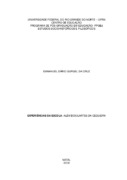Use este identificador para citar ou linkar para este item:
https://repositorio.ufrn.br/handle/123456789/25509| Título: | Experiências da escola: além dos limites da cegueira |
| Título(s) alternativo(s): | School experiences: beyond the limits of blindness |
| Autor(es): | Cruz, Emmanuel Dário Gurgel da |
| Orientador: | Passeggi, Maria da Conceição Ferrer Botelho Sgadari |
| Palavras-chave: | Narrativas;Experiência;Pessoa cega;Enfrentamento;Inclusão |
| Data do documento: | 20-Fev-2018 |
| Referência: | CRUZ, Emmanuel Dário Gurgel da. Experiências da escola: além dos limites da cegueira. 2018. 128f. Dissertação (Mestrado em Educação) - Centro de Educação, Universidade Federal do Rio Grande do Norte, Natal, 2018. |
| Resumo: | A pesquisa teve como objetivo geral investigar, em narrativas autobiográficas de adultos cegos, os sentidos que atribuem às adversidades e aos processos de enfrentamento por eles vivenciados no contexto do Ensino Fundamental e Médio. Do ponto de vista teórico, o estudo se situa na perspectiva da pesquisa (auto)biográfica com pessoas cegas, e se assenta no pressuposto de que suas narrativas são fontes de conhecimentos imprescindíveis para se pensar a garantia de seus direitos a uma educação inclusiva e edificante. Como metodologia da pesquisa, utilizamos as entrevistas narrativas autobiográficas, inspiradas em Schütze (2010), Appel (2005) e Jovchelovitch e Bauer (2002). Participaram da pesquisa 4 (quatro) adultos cegos, entre 29 e 63 anos de idade. A investigação considerou princípios e métodos da pesquisa (auto)biográfica em Educação (Ferrarotti 2014a, 2014b; Delory-Momberger 2014; Passeggi 2010, 2011, 2014, 2016); estudos sobre a resiliência (Cyrulnik 2009; Sordi, Manfro e Hauck 2011; Angst 2009; Gallego Gómez 2014), e princípios da educação inclusiva, concernentes à pessoa deficiente visual (Vigotski 1994; Silva 2008; Amiralian 2000, 2005; Nunes e Lomônaco 2010). As narrativas dos participantes permitiram organizar as análises em três categorias temáticas: “relações com a escola regular e com a escola especial”, “estratégias de enfrentamento” e “tutores de resiliência”. Essas categorias conduziram à compreensão do sentimento de invisibilidade pedagógica, por parte dos participantes, ao evocarem suas experiências na escola regular. As análises das narrativas revelam que nos processos de enfrentamento as pessoas cegas privilegiam cinco estratégias primordiais: o diálogo; a persistência; o afastamento para o fortalecimento; a identificação de tutores de resiliência e a formação de grupos com pessoas por afinidade. Os resultados das análises permitem salientar a importância da escuta de adultos cegos sobre suas experiências na infância e na adolescência, dentro da escola, para que se possa melhor compreender as adversidades enfrentadas e as estratégias de enfrentamento por eles desenvolvidas, de modo a aprofundar estudos e reflexões sobre os direitos da pessoa com deficiência visual a uma educação inclusiva, com base no que vivenciaram pessoas concretas e no que elas dizem sobre suas reais necessidades. |
| Abstract: | The general aim of this research was to investigate, in autobiographical narratives of blind adults, the meanings they give to the adversitites and to the confrontation processes experienced by them in the context of elementary and high school. From a theoretical standpoint, the study embraces the perspective of the (auto)biographical research with blind individuals, and hinges on the pressuposition that their narratives are an indispensable source of knowledge to reflect upon the guarantee of their right to an inclusive, fruitful education. As regards the research methodology, we used autobiographical narrative interviews, as put forward by Schütze (2010), Appel (2005) and Jovchelovitch& Bauer (2002). Four blind adults took part in the research, with ages ranging from 29 to 63 years old. The investigation adopted principles and methods from the (auto)biographical research in Education (Ferrarotti 2014a, 2014b; Delory-Momberger 2014; Passeggi 2010, 2011, 2014, 2016); studies about resilience (Cyrulnik 2009; Sordi, Manfro& Hauck 2011; Angst 2009; Gallego Gómez 2014); and principles from Inclusive Education regarding the blind person (Vigotski 1994; Silva 2008; Amiralian 2000, 2005; Nunes&Lomônaco 2010). The participants narratives allow us to organize the analyses into three thematic categories: “relations with the regular and the special school”, “strategies of confrontation” and “resilience tutors”. These categories led us to understand the feeling of pedagogical invisibility, on the part of the participants, when they evoked their experiences in the regular school environment. The analyses of the narratives reveal that, in the processes of confrontation, blind people privilege five main strategies: dialogue; persistence; estrangement in order to strengthen; the identification of resilience tutors; and the formation of groups based on affinity. The results of the analyses allow us to highlight the importance of listening to blind adults as they talk about their school experiences during childhood and adolescence, so that one can better understand the difficulties they found and the strategies of confrontation they developed, in order to deepen the studies and reflections about the right of the visually-impaired to an inclusive education, based on what real people experienced, and on what they said about their real needs. |
| URI: | https://repositorio.ufrn.br/jspui/handle/123456789/25509 |
| Aparece nas coleções: | PPGED - Mestrado em Educação |
Arquivos associados a este item:
| Arquivo | Descrição | Tamanho | Formato | |
|---|---|---|---|---|
| EmmanuelDarioGurgelDaCruz_DISSERT.pdf | 934,05 kB | Adobe PDF |  Visualizar/Abrir |
Os itens no repositório estão protegidos por copyright, com todos os direitos reservados, salvo quando é indicado o contrário.

